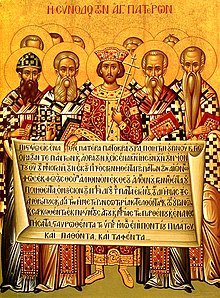
Back المجامع المسكونية السبعة Arabic المجامع المسكونيه السبعه ARZ প্রথম সাত সার্বজনীন পরিষদ Bengali/Bangla Primers set concilis ecumènics Catalan First seven ecumenical councils English Primeros siete concilios ecuménicos Spanish هفت شورای جهانی اول Persian Tujuh konsili oikumenis pertama ID 全地公会議 Japanese L-ewwel seba' konċilji Ekumeniċi Maltese

Dalam sejarah agama Kristian, tujuh majlis ekumenikal pertama ataupun boleh disebut Tujuh Sidang Ekumenikal (Pertama) termasuk yang berikut: Konsili Nicea Pertama pada tahun 325, Konsili Konstantinopel Pertama pada tahun 381, Konsili Efesus pada tahun 431, Konsili Chalcedon pada tahun 451, Konsili Konstantinopel Kedua pada tahun 553, Konsili Konstantinopel Ketiga dari 680–681 dan akhirnya, Konsili Nicea Kedua pada tahun 787.
Gereja Ortodoks Timur dan Gereja Katolik Rom menerima semua tujuh dewan sebagai Majlis Ekumenikal yang sah. Gereja Ortodoks Oriental mengiktiraf hanya tiga majlis pertama sebagai majlis ekumenikal yang sah, sementara gereja-gereja timur hanya mengiktiraf kesahihan dua daripada tujuh majlis pertama ini. Terdapat juga majlis tambahan (Majlis Quinisextum), yang diadakan antara Majlis Kelima dan Keenam (pada tahun 692 Masihi). Majlis itu diiktiraf sebagai majlis oicumenical oleh Gereja Ortodoks Timur sahaja, tetapi Gereja Ortodoks Timur tidak mengira majlis itu, dan hanya mengiranya sebagai kesinambungan Majlis Oicumenical Keenam. Gereja Katolik Rom tidak mengiktiraf kesahihan Majlis Quinisextum[1][2], tetapi Gereja Katolik dan beberapa pakar dalam Gereja Ortodoks Timur mengiktiraf kewujudan beberapa majlis susulan selepas tujuh majlis oicumenical pertama ini.
- ^ Schaff's Seven Ecumenical Councils: Introductory Note to Council of Trullo: "From the fact that the canons of the Council in Trullo are included in this volume of the Decrees and Canons of the Seven Ecumenical Councils it must not for an instant be supposed that it is intended thereby to affirm that these canons have any ecumenical authority, or that the council by which they were adopted can lay any claim to being ecumenical either in view of its constitution or of the subsequent treatment by the Church of its enactments."
- ^ Encyclopædia Britannica "Quinisext Council". Encyclopædia Britannica. Retrieved February 14, 2010. "The Western Church and the Pope were not represented at the council. Justinian, however, wanted the Pope as well as the Eastern bishops to sign the canons. Pope Sergius I (687–701) refused to sign, and the canons were never fully accepted by the Western Church".